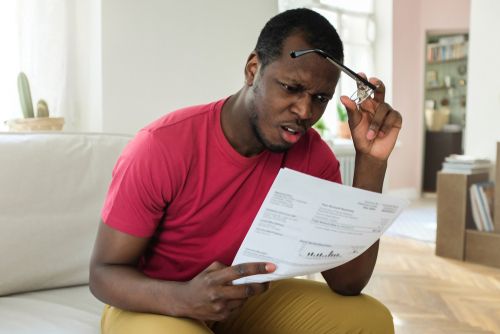You can be the most careful and skilled driver in the history of the world, and that still won’t be enough to guarantee you will never be involved in a car accident.
With so many people sharing the same roads at any given time, all it takes is one miscalculation on one driver’s part for an accident to happen. Sometimes, you can do everything right, and an accident will still take place because of factors out of your control.
Hopefully, you will never be part of a serious incident, but even a minor accident can have an effect on you. To be more specific, your insurance rates could look different in the aftermath of a vehicular accident.

Why Are My Insurance Rates Affected by an Accident?
It probably comes as no surprise that your insurance rate can change depending on whether or not you were involved in an accident. Still, it’s worth detailing why that happens.
Insurance companies consider numerous factors when they try to pin down what rate to offer you. You can check them out below.
- Age – Insurance companies are more likely to offer you a friendly insurance rate if you’re an experienced driver, but that’s not always the case. If the company knows that you also lend your car to drivers under the age of twenty-five, your rate could end up higher.
- Gender – Women have a better chance of paying less for auto insurance because the statistics say that they get into fewer accidents.
- Place of residence – Where you live can play a role in how much they ask you to pay for auto insurance. City dwellers can expect to get higher rates than car owners in more rural areas. They may also ask you to pay more if you park your vehicle on the street instead of inside your garage.
- Car usage – If you use your car to drive to and from work, your insurance rate will reflect that. Specifically, the rate will be higher because of how much you use your car.
- Car type – Aside from the cost of the car itself, insurers may also consider how much it may potentially cost to repair, and the safety features it possesses before presenting you with a price.
- Insurance history – Are you diligent with maintaining auto insurance? They will reward those who are with lower insurance rates. On top of that, those who stick with a single provider may earn loyalty discounts.
Those are some of the main factors insurance companies use to calculate a customer’s insurance rate, but there are two in particular that are heavily influenced by your accident history or lack thereof.
Claims Record
Insurers will often look at your claims record before they present a rate. They may ask drivers who file claims often within a short period of time to foot a larger bill.
If a company finds at-fault claims on your record, you can also bank on the final offer to you being higher.
Driving Record
Don’t forget that insurance companies are going to check out your driving record when they calculate your insurance rate.
While examining your driving record, insurers will look at traffic violations you may have committed. Those will also factor into the calculus of your insurance rate.
Any accidents you may have caused are going to appear on your driving record, and you can bet that insurance companies will hone in on them. Expect your rate to skyrocket if you have caused an accident before.
You should also know that having multiple violations and/or accidents on your driving record can result in an insurer not offering you a conventional policy. They may deem you too much of a risk for that. In that case, your only hope to be on the road with some form of coverage is to seek a different kind of policy or wait until those items disappear from your record.
How Long Can a Previous Accident Affect My Insurance Rates?
Now that we understand why accidents have a sizable impact on insurance rates, let’s answer a question closely related to that.
How long will an accident impact the insurance rates you’re getting from companies?
Drivers will be glad to know that their previous mistakes will not doom them to a lifetime of onerous auto insurance rates, but then again, the punishment for your offense cannot be too lenient if it is supposed to serve as a deterrent.
We can’t say how long you’ll wait before your earlier mishaps will stop impacting your current finances because states vary when it comes to that particular matter.
Accidents may only remain on records for around three years in some states, but that can extend to five and potentially even longer in others.
If your plan to hold off on applying for one until your driving record is cleaner, you need to hope that your state is more agreeable in that regard. For those who live in states that punish careless drivers more harshly, the wait can end up being a long one.
When Can I Be Considered ‘At Fault’ for an Accident?
Insurance companies penalizing drivers for accidents they caused is fair and understandable. You won’t find a lot of people complaining about that policy.
But how can you tell if the incident is one, they will consider you at fault for or if they will see you as blameless for the whole ordeal?
First, it helps to define what an accident is in the eyes of insurance providers. Many of them tend to look at the cost when determining whether or not they can classify an incident as an accident.
If the incident in question features a claim that exceeds $750 due to the property damage liability coverage and collision coverage, a lot of insurers will look at that as an accident. That alone does not mean that you are on the hook for what happened, however.
Insurance companies also tend to look at how much of the accident you were responsible for when determining whether they can consider you at fault for what happened.
During the review process, insurers will look to ascertain if you were 50 percent at fault for the accident. If they deem you are at that 50 percent threshold or have even exceeded it, then you can expect to be blamed for the incident.
They will impose the subsequent penalties with being at fault for a car collision or accident, and that means your insurance rate is going up.
Given that you must be 50 percent responsible for what happened for it to be considered an at-fault accident, you can avoid some serious penalties if you can prove that you are not liable for what happened. To do that, you will need to prove a few things.
Let’s say the incident took place on the road. Someone rear-ends your car, or perhaps an irresponsible driver bumped into your vehicle before fleeing the scene – an event otherwise known as a hit and run.
Insurance companies may not hold you responsible for what happened if you were involved in those types of incidents. However, you must prove your innocence too.
They will deem drivers charged with a traffic violation related to the accident at fault as well. In the case of a hit and run, you need to report that to the authorities right away for the insurers to consider it.
You can also avoid them from holding you responsible if you can show the insurance company that your car was parked legally when the incident occurred. Insurers do not blame you if the damage is by an animal or an extraordinary event.
Can Accidents I’m Not Responsible for Still Cause My Insurance Rates to Go Up?
Many people assume their insurance rates will stay the same once an insurance provider has determined they are not the ones at fault for an accident. For the most part, that is true. An isolated incident that you were not responsible for will not be the reason why you pay more.
Notably, though, there are some exceptions to that rule.
Depending on where you live, some insurance companies may still hike up your rates if they find you involved in multiple accidents. To be clear, you do not need to be the person who caused the accident. Insurers may raise your rate anyway because of how often you are uninvolved in these unfortunate events.
This is a concern for car owners who live in areas where robberies often happen. Insurers are cautious people steal your car often, and they may increase the rates to protect themselves. There’s also a chance they may not offer you any policy.
How Much More Will I Have to Pay for Insurance after Being Involved in an At-Fault Accident?
An interesting thing to note about auto insurance rates is they are not guaranteed to go up even after you caused an accident.
Assuming that you have a good record, and this is the first time you were involved in an accident of your own making; you can find insurers that will be understanding. They may tell you to be more careful in the future but keep your rate where it is.
Insurers like that are hard to find, but if you have the time to seek them out, that is certainly worth doing.
Now, there are also instances wherein you may have to pay more, but not because your rates went up. You may pay more because you are no longer qualified for discounts related to your pristine driving record.
Some insurers will raise your insurance as a penalty for your irresponsible actions. One accident can cause a big bump in your insurance rates, but multiple accidents can lead to them blowing up.

How Big Will the Rate Increase Be?
There is no blanket answer for how big the rate spike will be following your involvement in an at-fault accident. Many insurance companies have formulas they use to calculate the surcharges they will impose, and those can vary significantly.
Some states have rules in place for surcharges, and insurance companies must abide by them if they want to increase the rates they present to a customer.
Other states lack those rules. They give the insurance companies more freedom when it comes to determining rate increases. Still, the state government must approve those rules before they put them into practice.
If you’re still looking for a more concrete number, you can refer to the base rate of your auto insurance policy. Once you’ve been in an accident that you caused, the insurance company may change how much you pay based on the base rate.
They could add 20 to 40 percent of your policy’s base rate as a surcharge in the aftermath of an at-fault accident.
How Can Auto Insurance Rates Be Lowered?
Paying more for auto insurance does not need to be a permanent thing. Along with being more careful on the road, you also avoid filing too many claims lower your insurance rate. You can also try to raise your deductible to mitigate the rate hike.
Keep Your Insurance Rates Down by Working with a Good Lawyer
As you can see, proving that you are not the party responsible for a car accident is beneficial in more ways than one. Make sure that the facts of the incident come out, and you are not penalized unfairly by hiring a good lawyer.
Contact Batta Fulkerson now and protect yourself from any unnecessary insurance rate hikes.




